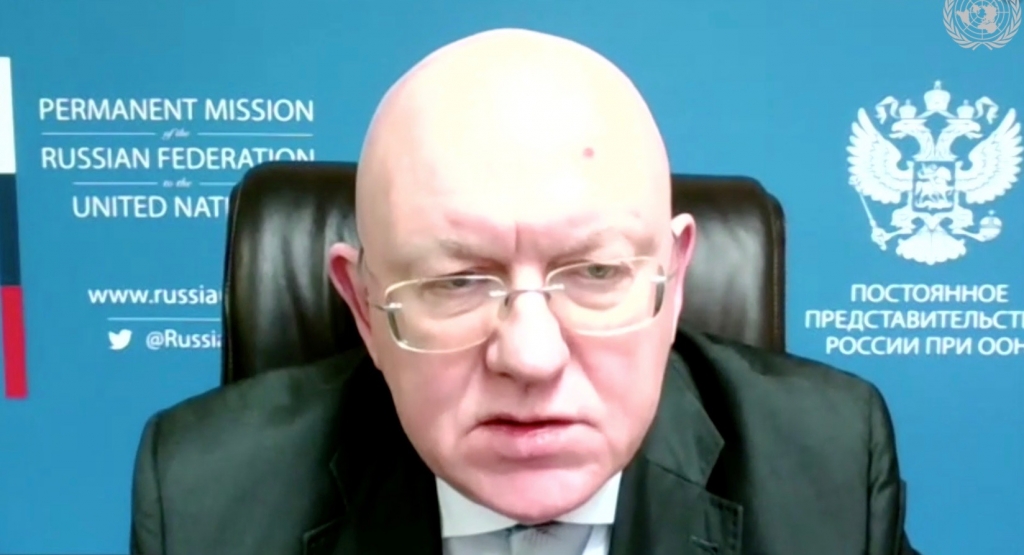Statement by Permanent Representative Vassily Nebenzia at an Arria-Formula VTC of UNSC members “Religion, Belief and Conflict: the protection of members of religious and belief groups in conflict and religious actors in conflict resolution”
Mme. President,
We thank all today’s briefers.
The issue of countering religious intolerance is one of Russia’s priorities. Our country pays close attention to preventing religion-based discrimination, persecution of worshipers and religious leaders. In our view, these problems should be considered in a comprehensive manner, with equal approaches to all world’s traditional religions.
Representatives of different cultures and religions have been living side by side in Russia for many centuries. Russian multi-national and multi-religious society, based on the principle of mutual respect, tolerance, and understanding, can be considered as a good model.
Russia consistently stands for establishing global cooperation in the area of ensuring interreligious pace and stability, in the first place in multi-religious communities.
In May 2022, in cooperation with the Inter-Parliamentary Union and the United Nations, Russia will host the World Conference of Heads of States, Parliamentarians and Representatives of the World Religions on Intercultural and Interreligious Dialogue for the Benefit of Peace and Mankind. The format of the conference provides for the direct dialogue between governments, legislators, and religious leaders. We are convinced that it will make a meaningful contribution to achieving common understanding and harmony between representatives of different religions.
Russia is active at the religion-related track of the work of the United Nations, Council of Europe, Organization for Security and Cooperation in Europe. The United Nations, including the Third Committee of the General Assembly and the Human Rights Council, pays much attention to the religious agenda. These bodies regularly adopt resolutions on religious freedom and countering religious intolerance. As for the culture of peace, the General Assembly adopts annually a range of resolutions designed to promote intercultural and interreligious dialogue, where Russia often acts as a co-sponsor. But we have to state with regret that in December 2020, a number of Western countries refused to support UNGA resolution 75/26, because it envisaged measures against religious contempt which did not comply with their commitment to absolutize the freedom of expression, which proves that despite all the goodwill, adopting such documents still remains a very sensitive subject.
Mme. President,
The situation of Christians in the Middle East, who have been part of that landscape and have lived there for millennia, raises grave concern, as well as the situation of Yazidis. Since the beginning of the Arab Spring, a huge number of Christians, amounting, according to various estimates, to at least 1 million people, were forced to leave the region.
Despite the defeat of ISIL in Syria, a number of its regions, in particular the Idlib de-escalation zone, remain affected by the terrorist operations of “Jabhat al-Nusra”. Elimination of the hotbed of terrorism in Idlib and progress with political settlement in Syria based on respect for territorial integrity and sovereignty of Syria would contribute to sustainable improvement of the status of Christians.
In the context of promoting Syria’s post-conflict recovery, we would like to highlight the efforts of Russian religious leaders. Russia’s Presidential Council for Coordination with Religious Organizations established an Interreligious Working Group on the relief to the Syrian population. The WG provides humanitarian assistance, restores social infrastructure facilities, i.a. schools, hospitals, and sanctuaries.
To support Syria’s efforts in preserving its ethnic and religious balance and diversity, Russia helps organize regular meetings of heads of Syria’s religious communities and confessions.
Since terrorists were defeated in Iraq, the situation of the Christian minority, unfortunately, has not seen any significant improvement. The lack of relevant infrastructure deters the return of Iraqi Christians to their desired places of residence. Most of the churches and monasteries of Mosul’s Christian community still lie in ruins.
Mme. President,
The issue of persecution is characteristic not only of the Middle East. It goes around the globe and, paradoxically, also finds its place in Europe. We remain concerned over the situation with the faithful of the Ukrainian Orthodox Church of the Moscow Patriarchate in Ukraine. Direct interference of Kiev’s authorities in church affairs for the sake of narrow political goals continues to sow discord among Ukrainian Orthodox Christians. Political games around the autocephaly and pressure on believers which is envisaged by Law 4128 of Ukraine make the worshipers go through hard times. Hostile seizure of parishes of Ukraine’s Canonical Orthodox Church has been legitimized, whereas its laity and clergy encounter physical intimidation coming from local radicals. During the coronavirus pandemic, the local Media launched large-scale campaign to discredit the laity and clergy of the Ukrainian Orthodox Church of the Moscow Patriarchate, labeling them as “the source of the virus”. Established facts of attacks on the worship sites, the priests and the congregation are registered by the international human rights monitoring mechanisms, including the UN Human Rights Monitoring Mission in Ukraine. However, the officials in Kiev keep ignoring the Mission’s assessments and conclusions.
Thank you.
